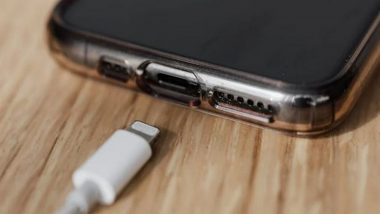New Delhi, June 26: India is poised to enforce a new regulation mandating USB-C connectors on all smartphones and laptops by 2026, aligning with global efforts to standardize charging solutions and reduce electronic waste. According to a report obtained by GAM Arena, smartphone manufacturers must comply with the USB-C standard by June 2025, while laptops must adopt USB-C ports for charging by the end of 2026.
The decision by Indian policymakers follows similar measures introduced by the European Union, which recently implemented regulations mandating USB-C connectivity starting this year. Nokia 3210 New Iconic Feature Phone Launched in India With YouTube and UPI Support; Check Price, Other Features and Specifications.
According to GSM Arena, the move aims to simplify the user experience by ensuring that all compatible devices use a universal charging cable, thereby reducing the proliferation of proprietary chargers and cables.
This transition is expected to encompass a wide range of devices beyond smartphones, including tablets, Windows laptops, and MacBooks, fostering interoperability across different platforms. Notably, the mandate does not extend to smaller accessories such as fitness bands, smartwatches, earbuds, or basic feature phones, emphasizing a focus on larger electronic devices like smartphones and laptops, as per GAM Arena.
While the Indian Union IT ministry has not issued an official statement yet, reports indicate that discussions with industry leaders have already taken place, receiving favourable responses towards the upcoming regulation. The introduction of USB-C across smartphones and laptops in India is anticipated to streamline production processes for manufacturers, potentially reducing costs associated with producing multiple types of chargers and cables, as per GSM Arena. iQOO Z9 Turbo Launched in China With Snapdragon 8s Gen 3 Processor; Check Price, Specifications and Names of Other Smartphones and Gadgets Introduced in Z9 Series.
It also aims to contribute positively to environmental sustainability efforts by minimizing electronic waste generated from obsolete charging technologies. As the regulation progresses towards implementation, stakeholders in the tech industry and consumers alike are expected to adapt to the standardized USB-C requirement, which promises a more seamless and eco-friendly future for electronic devices in India.
(The above story is verified and authored by ANI staff, ANI is South Asia's leading multimedia news agency with over 100 bureaus in India, South Asia and across the globe. ANI brings the latest news on Politics and Current Affairs in India & around the World, Sports, Health, Fitness, Entertainment, & News. The views appearing in the above post do not reflect the opinions of LatestLY)













 Quickly
Quickly


